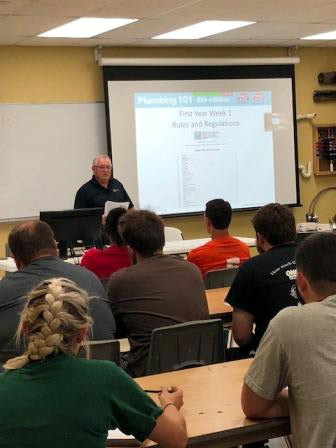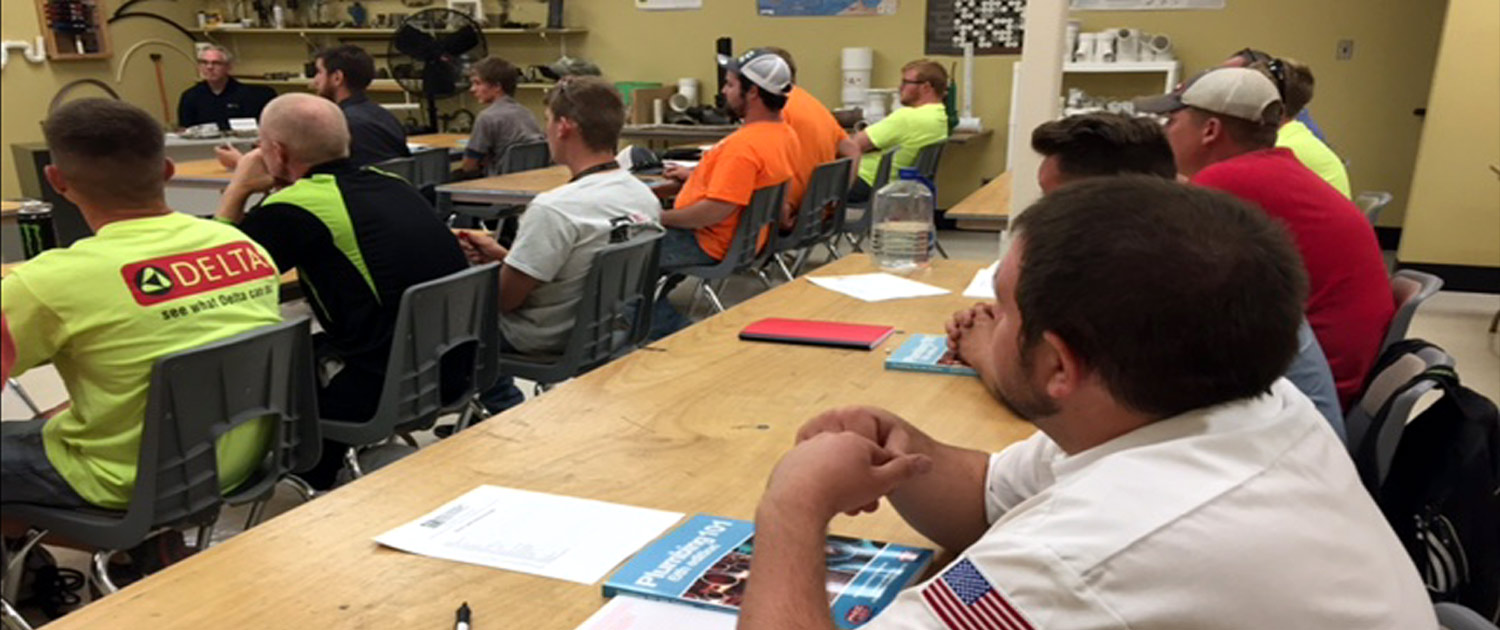Our Curriculum
Apprentices may enroll in the program at any time throughout the year. The academic year runs from August to May. Apprentices who enroll after the start of the school year may begin gaining on-the-job training; however, curriculum credit will not commence until the following academic year. Enrollment initiates the application process, allowing apprentices to obtain their apprentice license and work under the supervision of a licensed journeyman.
Class credit is awarded in yearly increments of 144 hours. Partial credit is not granted if the full academic year is not completed. If a student does not fulfill the requirements for an entire year, no credit will be awarded for that period. In the event of re-enrollment, the student must retake the full year.
Students are permitted a maximum of four absences per year.
Plumbing - Year 1
Year 1
Publications:
- PHCC Plumbing 101 7th Edition Textbook
What You Will Learn:
- Plumbing History, Codes, and Principles
- Definitions
- Tools of the Plumbing Trade
- First Aid and Safety
- Basic Math for Plumbing
- Water Supply, Water Sources, Waste Disposal, and Sewage Disposal
- Mechanical Properties and Protection of Building Materials and Structures
- Piping Materials Used in Plumbing Work
- Joining Methods for DWV and Pressure Piping
- Squares, Square Roots, and Basic Geometry
- Plumbing Fixtures
- Faucets and Related Devices
- Valves
- Water Heaters
- Building Plans, Drawings, and Scale Rulers
- Sketching
- Personal Finance
Plumbing - Year 2
Year 2
Publications:
- PHCC Plumbing 201 7th Edition Textbook
- Mechanical Skills Supplement
What You Will Learn:
- Communication Skills and Professionalism
- Piping Materials and Connection Methods
- Design Consideration for Special Applications of Plastic Pipe and Fittings
- Introduction to Welding
- Soldering, Brazing, Cutting, and Gas Welding
- Piping Materials, Sources, and Distribution for Potable Water
- Water Pipe Sizing: Main-and Branch and Individual Run Systems
- Water Heaters and Hot Water Distribution
- Cross-Connection Protection and Pipe Identification
- Sewers & Sewage Disposal Methods
- Drainage Fixture Units
- Building Drains
- Stacks
- Applied Plumbing Mathematics
- Applied Geometric Concepts
- Properties of Water and Air
- Venting Plumbing Drainage Systems
- Sump Pumps, Sewage Pumps, and Sewage Ejectors
- Plumbing Traps
- Fixture Supports
- Hoisting and Rigging
- Safety Concepts
- Rough-In Sheets, Single Line Drawings, and Isometric Drawings
- Details, Sections, and Exploded View Drawings
- Copper and Steel Press Fit Technology
- OSHA-10 Hour Construction Course and Certification
- Pro-Press Technology Certification
- Mega-Press Technology Certification
Plumbing - Year 3
Year 3
Publications:
- PHCC Plumbing 301 2nd Edition Textbook
- Mechanical Skills 1st Semester Supplement
- Mechanical Skills 2nd Semester Supplement
What You Will Learn:
- Workplace Etiquette and Productivity
- Residential Fixtures and Appliances
- Commercial, Industrial, and Institutional Fixtures and Appliances
- Installation Methods
- Fixture Fittings, Trim, and Installation
- Principles of Hydronic Systems
- Blueprints and Specifications
- Drawing Types, Floor Plans, and Site Plans
- Structural, Plumbing, Electrical, HVAC, and Detail Plans
- National Fuel Gas Code, Materials, and Types of Fuel Gases
- Fuel Gas Piping, Fittings, Connections, and Pipe Sizing
- Gas Appliances, Regulators, Meters, and Appliance Controls
- Combustion Air and Venting for Category 1 Appliances
- Fundamentals of Liquefied Petroleum Gas
- Level, Transit, Elevations, and Grade
- Builder’s Level, Transit, and Trench Safety
- Offsets and Ratios
- Tank Capacities, Volume, and Weight of Water
- Storm Draining and Sizing Storm Drains
- Cross-Connections
- Ejector Systems
- Impact of Temperature and Relative Humidity on Plumbing Systems
- Water Treatment
- Heat Sources for Water Heaters and Ancillary Piping
- Basic Electricity, Electric Current, and Electric Motors
- Electric Circuits, Circuit Protection, Control Wiring, and Electrical Safety
- Electric Circuit Troubleshooting
Plumbing - Year 4
Year 4
Publications:
- Indiana Plumbing Code (International Plumbing Code)
- Indiana Plumbing Code Amendments
- Indiana Plumbing License Law (IC-25-28.5)
- PROV Indiana Supplement
What You Will Learn:
- Off-Set Math
- Copper Project Assembly Procedures
- Plastic Pipe Project Assembly Procedures
- Cast Iron Project Assembly Procedures
- Indiana Plumbing Practical Test
- Plumbing Code Overview and Logic
- Plumbing Code Chapter 1 Administration
- Plumbing Code Chapter 2 Definitions
- Plumbing Code Chapter 3 General Regulations
- Plumbing Code Chapter 4 Fixtures and Faucets
- Plumbing Code Chapter 5 Water Heaters
- Plumbing Code Chapter 6 Water Supply and Distribution
- Plumbing Code Appendix E – Water Sizing
- Plumbing Code Chapter 7 Sanitary Drainage
- Plumbing Code Chapter 8 Indirect and Special Waste
- Plumbing Code Chapter 9 Vents
- Plumbing Code Chapter 10 Traps and Interceptors
- Plumbing Code Chapter 11 Storm Water Drainage
- Plumbing Code Appendix F – Structural
- Indiana License Law
Indiana Journeyman License Test Preparation
Great for you
Our curriculum is designed with you in mind. Classes are conducted one evening per week, beginning at 6:00 p.m. on Monday through Thursday, with a maximum of three hours of instruction per night.
The Mechanical Skills program comprises 34 classes per academic year, structured into two semesters with each semester further divided into two quarters.
On-the-Job Training (OJT) hours are recorded on a monthly basis, authenticated with a signature by a journeyman, and then submitted to your instructor for credit.

Interesting Info
An apprentice plumber is an individual “who is learning the plumbing trade; and is under the direction and immediate supervision of a licensed plumbing contractor or a licensed journeyman plumber.” – as defined by The State of Indiana
Contact Info
Mechanical Skills, Inc.
Plumbing Apprenticeship School
3535 E Michigan Street
Indianapolis, IN 46201
Phone: (317) 352-1189
Contact: info@mechanicalskills.org
Office Hours
Mon – Fri: 8:00am – 4:00pm

